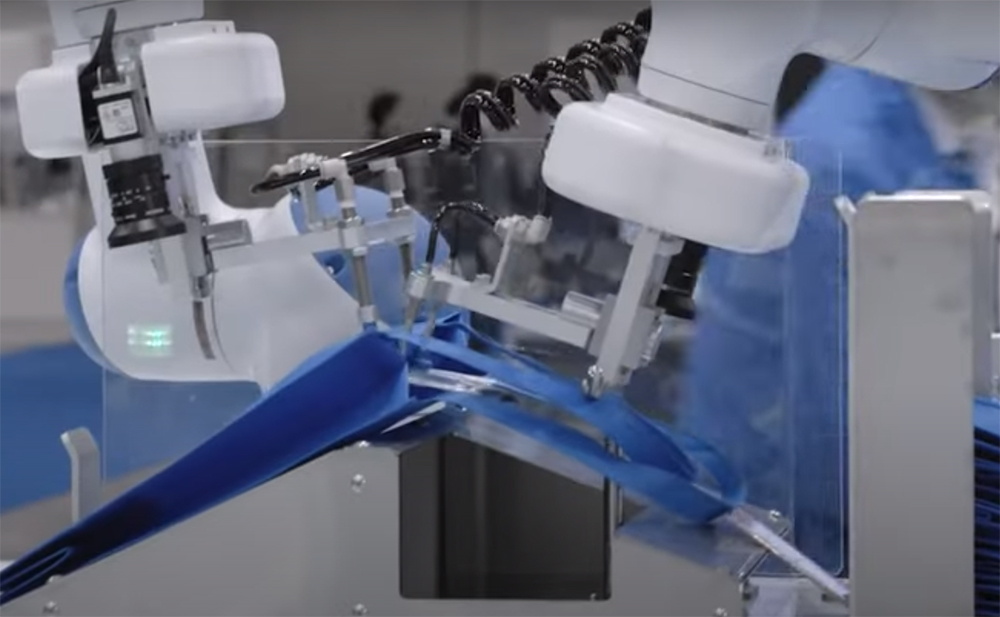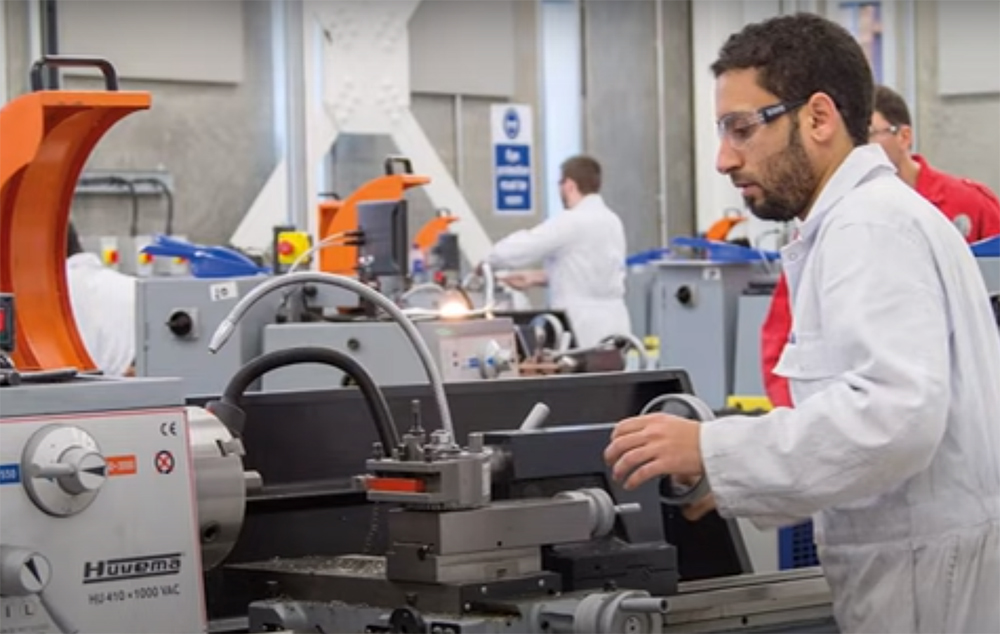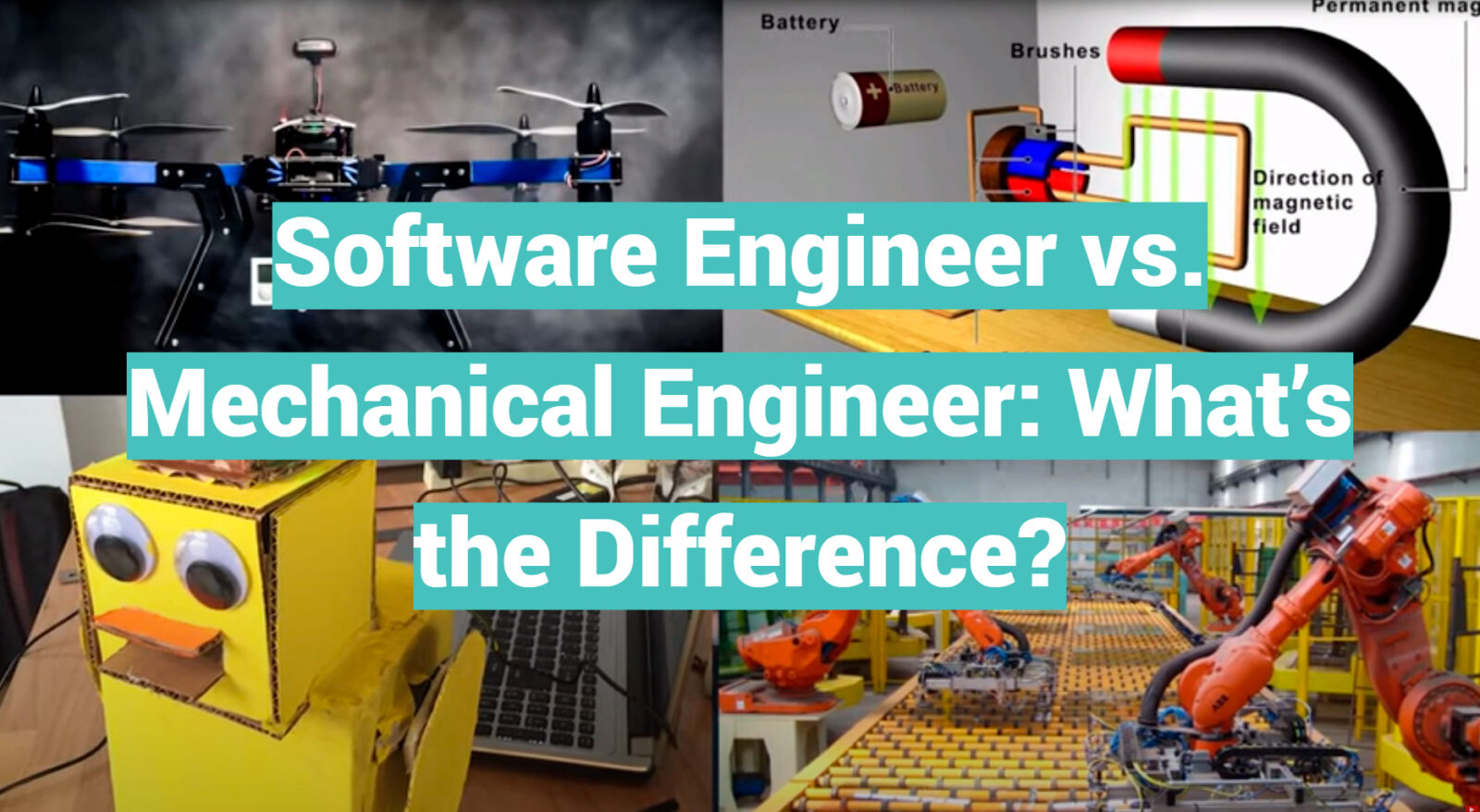In the dynamic landscape of modern engineering, the choice between software engineering and mechanical engineering represents a pivotal decision for aspiring engineers. This article delves into the contrasting realms of these two prominent disciplines, Software Engineering, and Mechanical Engineering, elucidating the fundamental disparities in their core principles, methodologies, and applications.
While software engineers craft the digital infrastructure underpinning our technologically interconnected world, mechanical engineers focus on designing the tangible, physical systems that power our everyday lives.
By examining the differences in educational pathways, job roles, and the evolving challenges and opportunities inherent to each field, this exploration aims to provide prospective engineers with valuable insights to aid in their career choices and pursuits.
What Is Mechanical Engineering:

Role
Mechanical engineers are the architects of the physical world, responsible for creating everything from intricate microdevices to massive industrial machinery. They design and develop a wide range of products and systems, such as engines, HVAC systems, and manufacturing equipment. The role of a mechanical engineer is to ensure that these systems operate efficiently and safely. They must consider factors like materials, energy, and the environment when designing mechanical systems.
Essential Skills:
- Mathematics and Physics: Mechanical engineering heavily relies on mathematical and physical principles to analyze and design systems. Engineers use calculus, algebra, and differential equations to solve complex problems;
- Materials Science: Understanding the properties and behavior of materials is crucial for selecting the right components and ensuring the durability of mechanical systems;
- Thermodynamics and Fluid Mechanics: These concepts are critical for designing engines, heating systems, and cooling systems. Engineers must understand how energy flows and how fluids behave in different conditions;
- CAD Software: Computer-Aided Design (CAD) software is essential for creating detailed designs and simulations of mechanical systems;
- Problem-Solving Skills: Mechanical engineers often encounter complex issues that require innovative solutions. Being a proficient problem solver is a must;
- Communication Skills: Engineers need to communicate their ideas effectively to colleagues, clients, and other stakeholders;
Responsibility
Mechanical engineers bear significant responsibilities. They are accountable for the entire lifecycle of a product or system, from concept and design to manufacturing and maintenance. Their role includes:
- Design: Creating detailed plans and specifications for mechanical systems. This involves considering performance, safety, and cost-effectiveness;
- Analysis: Using mathematical and computational tools to assess the performance of existing systems and propose improvements;
- Testing: Conducting experiments and tests to verify the functionality and safety of mechanical systems;
- Manufacturing Support: Collaborating with production teams to ensure that products are built according to design specifications;
- Maintenance: Developing maintenance schedules and procedures to ensure that mechanical systems continue to operate efficiently over their lifespan;
- Research and Development: Engaging in research to stay at the forefront of technological advancements and integrate new concepts into design and analysis processes;
- Environmental Considerations: Considering the environmental impact of mechanical systems and designing eco-friendly solutions [2];
What Is Software Engineering:

Role
Software engineers are the architects of the virtual world. They design, develop, and maintain software applications, from mobile apps and operating systems to web applications and embedded systems. The role of a software engineer is to create efficient, functional, and user-friendly software solutions to address a wide range of needs and challenges [3].
Essential Skills:
- Programming Languages: Proficiency in programming languages like Java, Python, C++, and JavaScript is essential for software engineers to write, test, and debug code;
- Algorithm and Data Structures: Software engineers must design efficient algorithms and data structures to process and manage data effectively;
- Software Development Methodologies: Familiarity with Agile, Scrum and other development methodologies is crucial for collaborative software development;
- Problem-Solving Skills: Software engineers encounter complex coding challenges and must find creative solutions;
- Version Control: Knowledge of version control systems like Git is vital for collaborative coding and code management;
- Database Management: Understanding database systems, SQL, and NoSQL databases is essential for handling data within applications;
- User Interface (UI) and User Experience (UX) Design: Creating user-friendly interfaces and enhancing the user experience is essential for many software applications;
Responsibility
Software engineers are responsible for creating, maintaining, and improving software systems. Their role includes:
- Analysis and Design: Gathering requirements and designing software systems that meet user needs;
- Coding: Writing, testing, and debugging code to create functional software;
- Testing: Ensuring that the software works correctly, identifying and fixing bugs, and optimizing performance;
- Maintenance and Updates: Continuously improving and updating software to meet changing user requirements and address security vulnerabilities;
- Documentation: Creating comprehensive documentation for code and software systems to aid other developers and users;
- Collaboration: Working in teams to develop complex software projects, often using agile methodologies;
- Quality Assurance: Ensuring that software is reliable, secure, and user-friendly [4];
Mechanical Engineer Vs. Software Engineer:
Job Duties
1) Mechanical Engineer
Mechanical engineers are the architects of the physical world. Their job duties involve designing, analyzing, and overseeing the manufacturing of various mechanical systems. From the small gears in your wristwatch to the massive turbines in power plants, mechanical engineers play a vital role in crafting the physical systems that power our daily lives. They are responsible for ensuring that these systems operate efficiently, safely, and sustainably.

Some common job duties of mechanical engineers include:
- Designing: Creating detailed plans and specifications for mechanical systems;
- Analysis: Using mathematical and computational tools to evaluate the performance of existing systems and propose improvements;
- Testing: Conducting experiments and tests to verify the functionality and safety of mechanical systems;
- Manufacturing Support: Collaborating with production teams to ensure that products are built according to design specifications;
- Maintenance: Developing maintenance schedules and procedures to ensure that mechanical systems continue to operate efficiently over their lifespan;
- Research and Development: Engaging in research to stay at the forefront of technological advancements and integrate new concepts into design and analysis processes;
2) Software Engineer
Software engineers, on the other hand, are the architects of the virtual world. They focus on designing, developing, and maintaining software applications, from mobile apps and operating systems to web applications and embedded systems. Their job is to create efficient, functional, and user-friendly software solutions to address a wide range of digital needs and challenges.
Key job duties of software engineers include:
- Analysis and Design: Gathering requirements and designing software systems that meet user needs.
- Coding: Writing, testing, and debugging code to create functional software;
- Testing: Ensuring that the software works correctly, identifying and fixing bugs, and optimizing performance;
- Maintenance and Updates: Continuously improving and updating software to meet changing user requirements and address security vulnerabilities;
- Documentation: Creating comprehensive documentation for code and software systems to aid other developers and users;
- Collaboration: Working in teams to develop complex software projects, often using agile methodologies.
- Quality Assurance: Ensuring that software is reliable, secure, and user-friendly.
Job Requirements
1) Mechanical Engineer
Becoming a mechanical engineer typically requires a bachelor’s degree in mechanical engineering or a related field. Beyond formal education, mechanical engineers need to possess strong analytical and problem-solving skills. They also require proficiency in computer-aided design (CAD) software for creating detailed engineering designs. Excellent communication skills are essential for collaborating with colleagues and conveying technical information to non-technical stakeholders [5].
2) Software Engineer
A bachelor’s degree in computer science, software engineering, or a related field is the most common educational path for aspiring software engineers. However, the software industry is known for its flexibility, and self-taught programmers often find success. Proficiency in programming languages like Java, Python, C++, and JavaScript is a must.
Familiarity with algorithm and data structure design, as well as knowledge of software development methodologies like agile, is also crucial. Strong problem-solving abilities and an aptitude for creative and logical thinking are highly valued.
Work Environment

1) Mechanical Engineer
Mechanical engineers can work in a variety of settings, including offices, manufacturing facilities, research and development labs, and even construction sites. They often split their time between computer-based design and analysis work and hands-on tasks involving machinery and equipment. Depending on their specific role, mechanical engineers may find themselves in an office environment, on the factory floor, or out in the field.
2) Software Engineer
Software engineers predominantly work in office environments or remotely, with access to high-performance computers. They spend the majority of their time writing, testing, and debugging code, often collaborating with team members. With the rise of remote work, many software engineers have the flexibility to work from various locations, making this field particularly attractive to those seeking work-life balance.
Skills
1) Mechanical Engineer
Mechanical engineers must possess a strong foundation in mathematics and physics to analyze and design mechanical systems. Knowledge of materials science is crucial for selecting the right components and ensuring the durability of mechanical systems. They also need expertise in thermodynamics and fluid mechanics, particularly when designing systems like engines or HVAC systems. Proficiency in CAD software is vital for creating detailed designs, and strong problem-solving skills are essential for addressing complex engineering challenges.
2) Software Engineer
Software engineers require proficiency in programming languages to write, test, and debug code. They must understand algorithm and data structure design to process and manage data efficiently. Knowledge of software development methodologies such as agile is important for collaborative software development. Familiarity with version control systems like Git is essential for code management and collaboration. Additionally, software engineers need to be skilled in user interface (UI) and user experience (UX) design to create user-friendly applications [6].
Salary
1) Mechanical Engineer

2) Software Engineer
Hours
1) Mechanical Engineer
Mechanical engineers often work standard full-time hours, typically around 40 hours per week. However, they may need to work extra hours to meet project deadlines or address urgent issues.
2) Software Engineer
Software engineers generally work standard full-time hours as well. However, the tech industry’s culture often emphasizes flexibility, making it common for software engineers to have the option of remote work or flexible schedules.
Personalities
1) Mechanical Engineer
Mechanical engineers often possess qualities such as precision, attention to detail, and a passion for understanding how things work. They tend to enjoy hands-on tasks and are drawn to the physical aspects of engineering.
2) Software Engineer
Software engineers are typically characterized by their problem-solving skills, logical thinking, creativity, and an aptitude for abstract concepts. They are comfortable with continuous learning and adapting to evolving technologies [7].
Work Culture
1) Mechanical Engineer

Work culture in mechanical engineering is often rooted in traditional engineering practices. Engineers in this field may find themselves in hierarchical organizational structures with a strong emphasis on safety and quality in manufacturing and construction processes.
2) Software Engineer
The software engineering field has a more dynamic and fast-paced work culture. It often embraces agile methodologies, frequent iterations, and collaborative teamwork. The tech industry is known for fostering a culture of innovation, creativity, and adaptability.
Lifestyle
1) Mechanical Engineer
The lifestyle of a mechanical engineer can vary based on their specific role and industry. Some may have more hands-on tasks that involve working on-site in manufacturing facilities or construction sites, while others may have a more office-based role. This diversity allows for a range of work-life balance options.
2) Software Engineer
How To Become A Mechanical Engineer:
Mechanical engineering is a rewarding and dynamic field, and becoming a mechanical engineer requires a combination of education, licensure, and certifications [8].
Here are the key steps to follow:
Obtain A Bachelor’s Degree In Mechanical Engineering:
- Choose a Degree Program: Start by enrolling in a bachelor’s degree program in mechanical engineering or a related field. Ensure that the program is accredited by a recognized accrediting body;
- Complete Coursework: During your undergraduate studies, you’ll cover a range of engineering topics, including mathematics, physics, materials science, thermodynamics, and mechanical design. Hands-on experience with computer-aided design (CAD) software is also crucial;
- Internships and Co-op Programs: Consider participating in internships or cooperative education (co-op) programs to gain real-world experience and network with professionals in the field;
- Senior Design Project: Many mechanical engineering programs include a senior design project where you can apply your knowledge to solve real engineering challenges;
Earn An Engineering License:
- Gain Work Experience: Most regions require several years of work experience as an engineer, typically under the supervision of a licensed professional engineer;
- Pass the Fundamentals of Engineering (FE) Exam: The FE exam is the first step in becoming a licensed engineer. It tests your knowledge of fundamental engineering principles;
- Acquire Professional Experience: Work as an engineer-in-training (EIT) or engineering intern for several years, accumulating the required experience;

- Pass the Professional Engineer (PE) Exam: After gaining the necessary experience, you can take the PE exam in your chosen discipline, such as mechanical engineering;
- Licensure Application: Apply for a professional engineering license in your jurisdiction once you’ve successfully passed the PE exam;
- Continuing Education: Maintain your license by fulfilling continuing education requirements [9];
Obtain Certifications
How to Become a Software Engineer:
Software engineering is a dynamic field that offers various paths to entry.
Here’s a step-by-step guide to becoming a software engineer:
Attain An Undergraduate Degree:
- Choose a Relevant Major: Pursue a bachelor’s degree in computer science, software engineering, or a related field. While not mandatory, having a formal education in computer science can provide a strong foundation;
- Learn Programming: Master programming languages like Java, Python, C++, or JavaScript. Practical coding skills are the heart of software engineering;
- Complete Internships: Seek internships or co-op programs in software development to gain real-world experience and build a portfolio;
Undergo Internship
Hands-on Experience: Participating in internships or cooperative education programs can provide valuable hands-on experience and help you build a network in the software industry.
Pursue A Specialization
Identify Your Interests: Software engineering offers diverse specializations, including web development, mobile app development, data science, artificial intelligence, and more. Identify your interests and pursue relevant coursework or projects.
Scout For Entry-Level Job Opportunities
Apply for Entry-Level Positions: Begin your career by applying for entry-level software engineering positions, such as junior developer or software developer roles.
Get Certified
Consider Industry Certifications: Depending on your chosen specialization, you may benefit from industry-specific certifications. For example, web developers might pursue certifications in web development frameworks, while data scientists could seek certifications in data analysis tools.
Attend Conferences

Networking and Learning: Attending industry conferences and meetups is an excellent way to network with professionals, learn about emerging technologies, and gain insights into the software engineering field.
Earn A Graduate Degree
Consider Advanced Education: While a bachelor’s degree is often sufficient to start a career in software engineering, some professionals choose to pursue a master’s degree in computer science or a related field to specialize further and potentially qualify for more advanced roles [10].
Similarities Between Mechanical Engineering and Software Engineering
Mechanical engineering and software engineering, while distinct in their focus, share several similarities:
- Engineering Principles: Both fields are rooted in engineering principles. They require a systematic and structured approach to problem-solving, design, and development;
- Mathematics and Physics: Mechanical and software engineers rely on mathematics and physics. Mechanical engineers use these to model and analyze physical systems, while software engineers use them to design algorithms and understand system behavior;
- Design and Creativity: Both professions involve design work. Mechanical engineers design physical systems and components, while software engineers create software systems, user interfaces, and user experiences;
- Problem-Solving: Problem-solving is at the core of both disciplines. Engineers in both fields must identify issues, come up with solutions, and optimize systems for performance, efficiency, and safety;
- Project Management: Mechanical and software engineers often work on projects that require planning, organization, and management. This includes setting goals, budgets, timelines, and resource allocation;
- Teamwork: In many cases, both mechanical and software engineers work as part of interdisciplinary teams. Collaborative skills are essential for successful project execution;
- Iterative Development: Both fields follow an iterative development process. Mechanical engineers refine designs through prototypes and testing, while software engineers use iterative software development methodologies like Agile;
- Documentation: Comprehensive documentation is essential in both fields. Engineers document their designs, development processes, and results to facilitate communication and ensure the reproducibility of work;
- Quality Assurance: Quality control is crucial in both disciplines. Mechanical engineers ensure that physical systems meet standards for safety and performance, while software engineers test and debug code to ensure that it functions correctly;
- Continual Learning: Both fields require engineers to stay up-to-date with evolving technologies and industry trends. Mechanical engineers need to adapt to new materials and manufacturing techniques, while software engineers must keep pace with programming languages and development tools;

- Regulations and Standards: Mechanical and software engineers may need to adhere to industry-specific regulations and standards. For instance, mechanical engineers designing HVAC systems must follow HVAC industry standards, while software engineers developing medical software must meet FDA regulations;
- Cross-Disciplinary Knowledge: As technology evolves, there is increasing overlap between the two fields. For instance, mechatronics combines mechanical and electronic systems and IoT (Internet of Things) involves software that interacts with physical devices;
- Ethical Considerations: Both mechanical and software engineers must consider ethical implications in their work. Mechanical engineers, for example, may work on projects with environmental and safety concerns, while software engineers need to address data privacy and security issues [11];
Which Is Easier – Mechanical or Software Engineering?
Here are some considerations to help you make an informed decision:
Aptitude and Interest: Your natural aptitude and interests play a significant role. If you have a strong inclination toward mathematics, logic, and problem-solving, software engineering might be more accessible. On the other hand, if you enjoy hands-on work, mechanics, and physics, mechanical engineering might align better with your skills.
Learning Style: Your preferred learning style can influence your perception of difficulty. If you enjoy abstract thinking and logic, software engineering, with its emphasis on coding and algorithms, may be more comfortable. Mechanical engineering often involves working with tangible, physical systems, which may suit individuals who prefer hands-on, visual learning.
Education and Background: Your educational background can also impact your ease of entry. If you have a strong foundation in computer science or programming, you may find software engineering more accessible. Likewise, if you have a background in physics or engineering, mechanical engineering might feel more intuitive.
Industry and Technology Trends: Both fields are continually evolving. Software engineering frequently experiences rapid changes in programming languages and technologies. Mechanical engineering is influenced by advancements in materials, manufacturing methods, and automation. Your perception of ease may depend on how well you can adapt to these evolving landscapes.
Work Environment and Preferences: Consider the type of work environment you find most appealing. Mechanical engineers often work in settings that involve physical systems, while software engineers predominantly work on computers. If you have a strong preference for one environment over the other, that could impact your perception of ease.
Career Goals: Your long-term career goals can also influence your choice. For example, if you aspire to work in the aerospace industry, mechanical engineering might be more suitable. If your goal is to develop cutting-edge mobile apps, software engineering aligns better with your objectives.
Interdisciplinary Skills: In some cases, having skills in both mechanical and software engineering can be an advantage. Fields like mechatronics and robotics require proficiency in both domains.
Can I Become a Software Engineer After Mechanical Engineering?
Yes, it is entirely possible to become a software engineer after obtaining a degree in mechanical engineering or any other related field. While the transition may require some effort and learning, it’s a feasible and increasingly common career change.
Here are the steps to help you make the transition:
Self-Assessment: Before making the switch, evaluate your interest and aptitude for software engineering. Ensure that you have a genuine passion for programming and software development. It’s a field that requires logical thinking, problem-solving skills, and a love for technology.
Learn Programming: Start by learning programming languages commonly used in software engineering, such as Python, Java, JavaScript, C++, or Ruby. Many online resources and coding bootcamps offer introductory courses that can help you get started.
Take Online Courses: Enroll in online courses, platforms, or MOOCs (Massive Open Online Courses) that offer in-depth training in software engineering topics. These courses often cover data structures, algorithms, and software development methodologies.

Work on Projects: Apply your learning by working on personal projects or contributing to open-source software. Building a portfolio of software projects can demonstrate your skills to potential employers.
Obtain Internships or Entry-Level Positions: Consider gaining practical experience through internships or entry-level positions. Even if you have a background in mechanical engineering, some employers may value your problem-solving skills and adaptability.
Networking: Attend software engineering meetups, conferences, and networking events. These connections can help you learn more about the field, find job opportunities, and get advice from experienced software engineers.
Advanced Learning: Depending on your goals, consider pursuing advanced education, such as a master’s degree in computer science. This can open doors to more specialized software engineering roles.
Certifications: Obtain relevant certifications in software engineering. These can demonstrate your expertise in specific areas and enhance your marketability.
Tailor Your Resume: When applying for software engineering positions, adjust your resume to highlight relevant skills, projects, and experiences. Emphasize how your background in mechanical engineering has prepared you for software development.
Showcase Transferable Skills: Highlight transferable skills from your mechanical engineering background, such as problem-solving, attention to detail, and project management, as these can be valuable in software engineering roles.
Be Persistent: Recognize that the transition may take time and multiple job applications. Stay persistent, continuously learn, and keep refining your software engineering skills.
Do Mechanical Engineers Use Software?
Yes, mechanical engineers frequently use software as an integral part of their work. Software plays a crucial role in various aspects of mechanical engineering, including design, analysis, simulation, and project management.
Here are some of the key areas where software is employed in mechanical engineering:
Computer-Aided Design (CAD): CAD software, such as AutoCAD, SolidWorks, and CATIA, is extensively used by mechanical engineers to create detailed designs and 3D models of mechanical components and systems. CAD software allows engineers to visualize and simulate their designs before physical prototyping, saving time and resources.
Finite Element Analysis (FEA): FEA software like ANSYS and Abaqus is used to perform structural and thermal analysis of mechanical components and systems. This software helps engineers evaluate stress, deformation, and heat distribution to ensure the safety and performance of designs.
Computational Fluid Dynamics (CFD): CFD software, such as OpenFOAM and COMSOL, is employed to simulate and analyze fluid flow and heat transfer in mechanical systems. This is crucial in designing HVAC systems, engines, and other fluid-related applications.
Mathematical and Numerical Analysis Tools: Mechanical engineers use software like MATLAB and Mathematica for mathematical modeling, optimization, and data analysis in various engineering applications.
Project Management Software: To manage complex projects, mechanical engineers often use project management software such as Microsoft Project, Trello, or Asana to schedule tasks, track progress, and collaborate with team members.
Data Analysis and Visualization: Tools like Microsoft Excel or specialized data analysis software are used for processing and visualizing experimental and simulation data.
Simulation Software: Beyond FEA and CFD, engineers use simulation software for various purposes, including simulating dynamic systems, control systems, and manufacturing processes.
PLM (Product Lifecycle Management) Software: PLM software systems like PTC Windchill and Siemens Teamcenter help manage the entire lifecycle of a product, from concept to design, manufacturing, and maintenance.
Automation and Control Software: In manufacturing and robotics, software is used to control automated systems and robots, ensuring precision and efficiency in production processes.
CAD-CAM Integration: Computer-aided design and Computer-Aided Manufacturing (CAM) software work together to take a product from the design phase to actual production. CAM software is essential for creating toolpaths and instructions for CNC machines.
Custom Scripting and Programming: Some mechanical engineers use programming languages like Python or MATLAB to develop custom scripts and tools for specific engineering tasks.
FAQ:
-
Is mechanical or computer engineering better?
The choice between mechanical and computer engineering depends on your interests and career goals. Mechanical engineering focuses on designing and analyzing physical systems, while computer engineering deals with computer hardware and low-level software. Neither is inherently better; the choice should align with your passions and strengths.
-
Is mechanical engineering the highest salary?
Mechanical engineering can offer competitive salaries, but it’s not necessarily the highest-paying engineering field. Salaries can vary based on factors like location, experience, specialization, and industry.
-
How much does a mechanical engineer make?
The salary of a mechanical engineer varies by factors such as location, experience, and industry. In the United States, the median annual wage for mechanical engineers was approximately $88,430 in 2020.
-
How much does a software engineer make?
Software engineers often earn competitive salaries. Their income varies based on location, experience, and the specific role. In the United States, the median annual wage for software developers was around $112,620 in 2020.
-
Is software engineering the same as mechanical engineering?
No, software engineering and mechanical engineering are distinct fields. Software engineering focuses on designing, developing, and maintaining software applications, while mechanical engineering deals with designing and analyzing physical systems and machinery.
-
Can a mechanical engineer be a software engineer?
Yes, it’s possible for a mechanical engineer to transition into a software engineering career. This transition typically requires learning programming languages and gaining proficiency in software development through self-study, courses, or additional education.
-
Who earns more, a mechanical engineer or software engineer?
In general, software engineers tend to earn higher salaries compared to mechanical engineers. The demand for software engineers, particularly in technology-related industries, has led to competitive compensation packages.
-
Which is more difficult, software or mechanical engineering?
The perceived difficulty of software versus mechanical engineering is subjective and depends on individual aptitude and interests. Both fields have unique challenges, making it challenging to definitively label one as more difficult than the other.
-
Do mechanical engineers do a lot of coding?
Mechanical engineers do engage in coding to some extent, especially for tasks like automating design processes, conducting simulations, and data analysis. However, the amount of coding varies depending on the specific role and industry.
-
Do mechanical engineers use C or C++?
Some mechanical engineers use programming languages like C or C++ for tasks such as embedded system development, control systems, or software tools. However, the choice of programming language can vary based on the specific engineering application.
-
Can a mechanical engineer build a computer?
While mechanical engineers primarily work on hardware design, some may have the knowledge and skills to assemble a personal computer. Building a computer typically involves selecting components and assembling them.
-
Why do software engineers make more than mechanical engineers?
Software engineers often earn more due to the high demand for their skills, especially in technology-related industries. The complex and rapidly evolving nature of software development contributes to their higher salaries.
-
Can a mechanical engineer learn artificial intelligence?
Yes, a mechanical engineer can learn artificial intelligence (AI). Learning AI may involve studying machine learning, deep learning, and neural networks. These skills can be valuable for various applications, such as robotics or predictive maintenance.
-
Can a mechanical engineer do machine learning?
Mechanical engineers can certainly learn and apply machine learning techniques. Machine learning can be used in predictive maintenance, quality control, and optimization of mechanical systems.
-
Can a mechanical engineer become a design engineer?
Yes, many mechanical engineers work as design engineers. Design engineers are responsible for creating and developing new products or improving existing ones. Mechanical engineering provides a strong foundation for this role.
-
Is mechatronics better than software engineering?
“Better” depends on your interests and career goals. Mechatronics combines mechanical, electronic, and software engineering, making it an appealing field for those who want to work at the intersection of these disciplines.
-
What are the 7 types of mechanical engineering?
Seven common types of mechanical engineering specializations include aerospace engineering, automotive engineering, HVAC engineering, robotics engineering, thermal engineering, manufacturing engineering, and materials engineering.
-
How much coding is used in mechanical engineering?
The amount of coding used in mechanical engineering varies based on the specific role and industry. While coding is not the primary focus, it is used for tasks like automation, simulations, and data analysis.
-
Are mechanical engineers still in demand?
Yes, mechanical engineers remain in demand across various industries, including aerospace, automotive, energy, and manufacturing. Their skills are valuable in designing, improving, and maintaining mechanical systems.
-
What is the hardest part of becoming a software engineer?
The hardest part of becoming a software engineer can vary from person to person. Some find abstract thinking and logic challenging, while others may struggle with the fast pace of technological changes and continuous learning required in the field.
Useful Video: Mechanical vs Software Engineering : Which is BETTER?
References:
- https://bestaccreditedcolleges.org/articles/mechanical-engineer-vs-software-engineer.html
- https://climbtheladder.com/mechanical-engineer-vs-software-engineer/
- https://work.chron.com/difference-between-mechanical-engineers-computer-programmers-25706.html
- https://kiiky.com/mechanical-engineering-vs-software-engineering/
- https://www.reddit.com/r/AskEngineers/comments/860ifi/mechanical_vs_software_engineering
- https://businesspluto.com/software-engineering-mechanical-engineering/
- https://smartsoftwareadvice.com/mechanical-engineer-vs-software-engineer/
- https://myeduscholars.com/mechanical-engineering-vs-software-engineering/
- https://allglobalupdates.com/mechanical-engineering-vs-software-engineering-salary/
- https://ultmeche.com/mechanical-engineer-or-software-engineer-comprehensive/
- https://www.bachelorsportal.com/articles/3140/a-comprehensive-guide-to-the-different-types-of-engineering-disciplines.html









Leave a Review